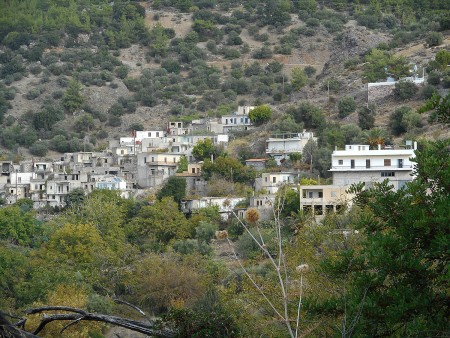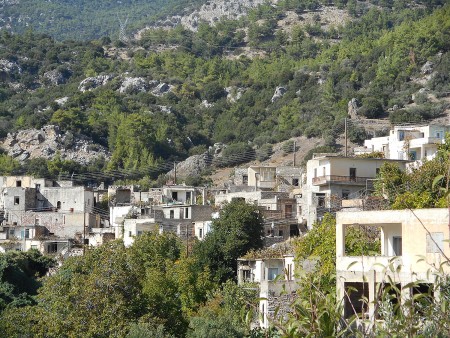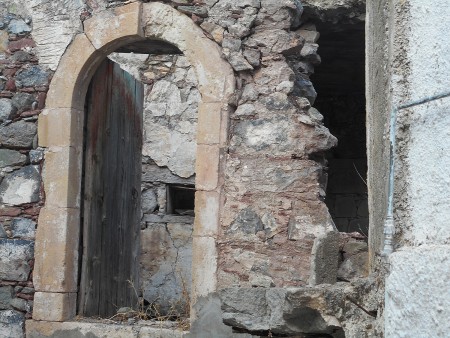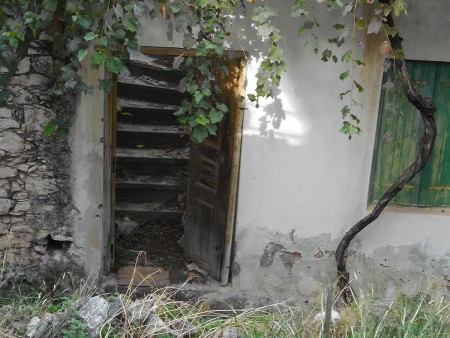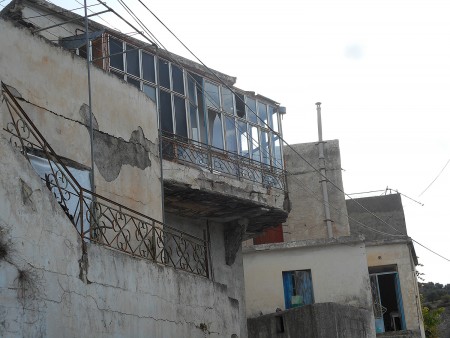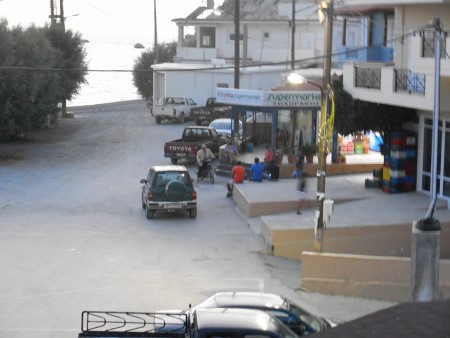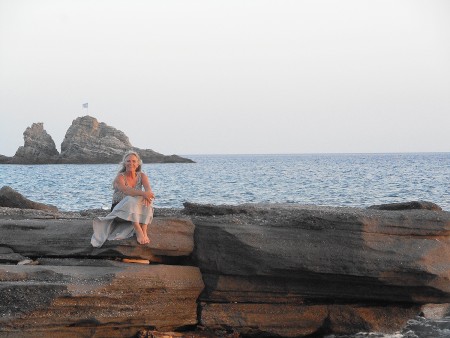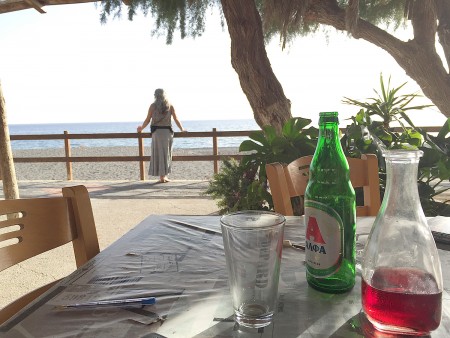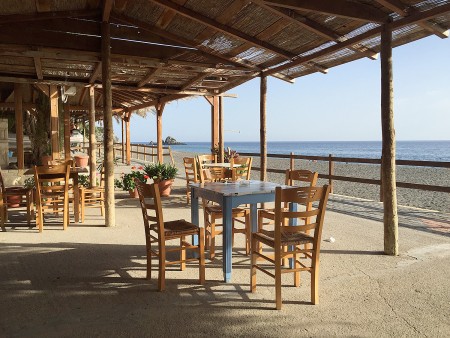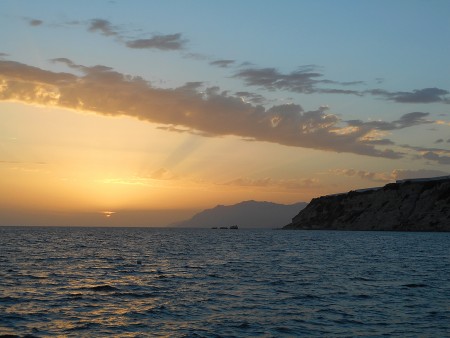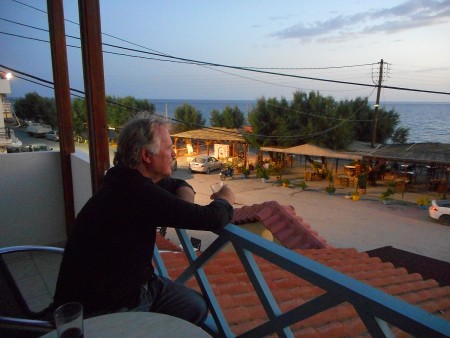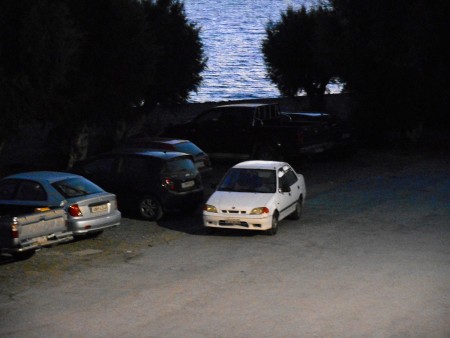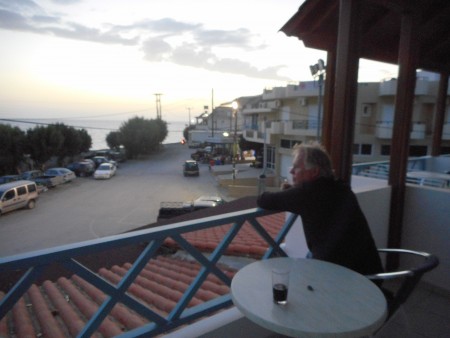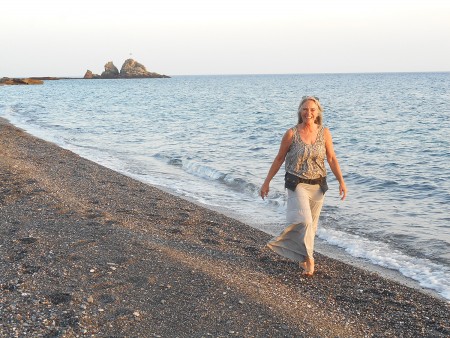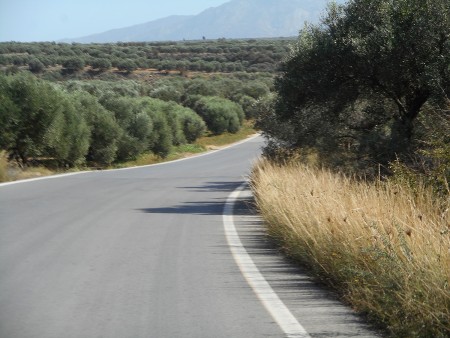 We had two nights left on Crete and the last one was going to be a simple sleepover in Iraklio (known to Google and such ilk as “Heraklion”.) We wanted something cool and different for the last “real” night on Crete and we’d heard that south-central and south-east Crete was where Cretans went for vacation. That fit the bill, along with the requirement that it couldn’t be too far from a main road past the Palace of Knossos on the way back to Iraklio. We did an Airbnb search for a place and there was only one town with a place that had a one night minimum: Sidonia (sid-oh-KNEE-ah.) We posted our booking request and went to bed.
We had two nights left on Crete and the last one was going to be a simple sleepover in Iraklio (known to Google and such ilk as “Heraklion”.) We wanted something cool and different for the last “real” night on Crete and we’d heard that south-central and south-east Crete was where Cretans went for vacation. That fit the bill, along with the requirement that it couldn’t be too far from a main road past the Palace of Knossos on the way back to Iraklio. We did an Airbnb search for a place and there was only one town with a place that had a one night minimum: Sidonia (sid-oh-KNEE-ah.) We posted our booking request and went to bed.
There wasn’t a response from our Airbnb request, which was unusual (cue the ominous uh-oh music), but we proceeded with Sidonia as our destination, knowing that we wouldn’t be online again until we got there, or unless we stopped at a wifi-equipped taverna.
We said good-bye to George and checked out of our Spili palace of unforgettable luxury. We covered a lot of familiar ground on our route to the next stop on what has become “Geni’s Hunt for Beachside Perfection and I Want to Retire Here and Forget the World Exists and Maybe They Won’t Notice I Don’t Speak The Language Because I Have Such a Beautiful Smile Trip.” It was familiar because it went past/along our routes to and from the Phaistos and Preveli Beach/Palm Forest.
After the drop down into the valley of Timpaki, Mires, and Agioi Deka, we entered a long, wide valley of hills between mountains that needs to be called “Where Olives Come From.” (Sorry that link doesn’t go to an olive tree in this valley I’m writing about, but that link is worth it.) There were olive trees everywhere there wasn’t a farmhouse or village. Everywhere. The trees crowded abandoned rock buildings. They nestled against cliffs and grew in dry creek beds. The branches draped over the shoulder of the road. I began to wish it was harvest season because I wanted to see how they got to every tree before the olives were rotting on the branch because a farmer took too long to get there.
I couldn’t imagine a tractor of any kind that could cover that uneven terrain during harvest. If there was one, it would have to be 4WD, small, strong, and fast. And they would need thousands of them. If no such vehicle exists, then they would need thousands of farm workers and I hadn’t seen that many people in the villages we’d been driving through. If anyone knows the secret, please post it in the comments.
We stuck to the southern side of the valley and then climbed up and over the range that had crept in between us and the Sea of Crete.
If you look at a map of Crete you’ll see that there are many villages on the south coast of Crete. If you look closer (which I did, but not with my usual piercing, inquisitive why-this-not-that mind) you’ll see that those villages aren’t connected along the coast. There is a “main” road several miles north that has branches to the south for each village. The previous sentence misses a key word: uphill. And another key word: downhill.
By now I was well aware that Crete was mountainous. But my “mind of assumptions and prior faulty thinking” still had its grip on the reality engine and I was unable to make the leap from the map to the thought: the villages don’t connect along the coast because the mountains are even steeper and more folded than anything we’ve seen in Croatia and Crete-to-date.
The closer we got to the road to Sidonia, the closer and tighter the canyons were, and the steeper the roads were going downhill. Geni had two maps and the iPhone GPS tool in her lap and, nevertheless, we made the “wrong” turn. We should have gone one road further. But if we had, we would have missed the white-washed village called Kalami, Crete. (Not to be confused with a northwestern Crete village of the same name.)
There, see how easy that was? You’ve been reading my posts and now you’re visualizing another surprising bit of unusual beauty and wonder, aren’t you?
Sorry to trick you like that. The switchbacks on the not-the-best road to Sidonia, brought us through Kalami, a ghost town. You could see that Kalami had once been a beautiful, thriving, white-washed Cretan village. But now it was empty. Trees were taking root in living rooms. Left-behind furniture was decaying in place. The doors were folded over and broken. The windows were busted out. The village, with a backdrop of achingly beautiful, tree-covered, tropical mountain, looked like rows of concrete skulls with empty eye sockets.
We dropped down a switchback or two and pulled over to look uphill at it. This was the saddest moment of our trip. What had happened here? Was it the great global recession? Did all the teenagers and young adults bolt for the big city? Were the old ladies in black shawls so disheartened that even they left the home of their ancestors? I’m sorry to say that I don’t have an answer at this moment.
The car was quiet as we continued down the switchbacks past the ridges covered with . . . greenhouses. Greenhouses and greenhouses. Lots of greenery inside, but no signs, at all, of anyone working. They probably got up early and finished early. These greenhouses were new-ish and it looked like an local economy had already rebuilt itself. But whatever income was happening here wasn’t spreading up the hill to Kalami.
We came around a corner into the suddenly-you’re-there of Sidonia and eased our way past the kids and moms walking in the middle of the street, and mingled with the motorcyclists that zoomed by us and barely didn’t hit the moms and kids, and came to the center of Sidonia . . . half taverna, half apartments, and 100% pebbly beach.
The village was shutting down for winter. One guy had a kid helping him put the coke/water/juice machines on an over-sized dolly and tuck them under a roof for the winter. Only one of the three tavernas was still operating.
I had kept my browser windows open for the Airbnb place we had requested, so we drove the beach street, looking at the photos on the webpage, in the effort to find the place. It turned out to be next door to the open taverna and was owned by the guy who was bucking coke machines around with the dolly.
We parked and decided we needed to quench our thirst while checking our Airbnb account. That’s when we discovered a deeper part of real Crete. There was a table of old men under the thatched roof by the water. They were drinking espresso at 15:00. A young girl was walking from their table back to the restaurant and I caught her halfway and asked for beer and wine. She looked at me like I was an alien and got that face that we’d seen many times by now: I want to help this guy but I don’t understand what he’s saying and I wish he would go away but he won’t so I’ll call my co-worker for help. Usually, that works out fine.
However, in this case, no such luck. There wasn’t a co-worker, or a friend or a neighbor who could help her out. Nobody in the vicinity spoke a tidbit of English. (Geni finally found a guy that had lived for a few years in Astoria. She got all excited for a moment because Astoria, Oregon is not that far from where she grew up. Nope. The woman was referring to Astoria, New York, a place Geni had never heard of. Her first assumption that the one in New York was named after her Astoria.)
The waitress didn’t know any of my three words for beer or my three words for wine. We went inside and I pointed at what we wanted. The entire time she seemed to be in a state of panic and I felt terrible for her. But I didn’t give up. I wanted my beer.
After returning to our table and sitting down, I realized that my phone had a signal so I checked our Airbnb account. Our request had been turned down for the apartment building we were sitting fifty feet away from. Geni got up (she’s our go-to make-happy-with-the-locals member of the team) and found out that the man that had been schlepping coke machines was the owner of the apartment building.
He thought for a moment and then said, “Sure. Let me show you.” She got a quick tour and he asked for 35 euro. The place was closed for the winter, but he would make an exception. The Airbnb price was 72 euro. Well, okay then, she said, You Bet. Then, in typical Geni fashion, she offered him 50 euro because she felt bad at taking such a big discount. He accepted 45 euro. (You can imagine my eye roll and little shake of the head at hearing about the discount followed quickly by the loss of said discount.)
We sipped our drinks and watched the ocean and it was time for another round. This time I brought out the heavy tool. I opened my iPhone and brought up my magic, must-be-from-the-future, voice translation app.
I said to it: “Another beer and red wine please.” The spinner spun for a few seconds, and then the Greek words showed up with the Roman transliteration below and it spoke the words out loud. I was ready.
I waited for our waitress to help another table full of locals (there were three tables of them by now and they all surreptitiously watched the us, the newcomers out-of-season) and I caught her in the street halfway back to the restaurant.
She stopped with her deer-in-the-headlights look and stared at me. I showed her the iPhone. She looked at it and then looked at the crazy man with the expensive phone. I pushed the play button. It spoke my request for beer and wine please.
She jumped two feet backward and said a bunch of Greek words in a hurry. She laughed and freaked at the same time. She didn’t know whether to run screaming or laugh again. I did my best to smile earnestly. Some guy walked up and she rattled a sentence or two at him and he looked at my phone. I played it again and he got that very-guy look about wanting such a cool tech object. He rattled at her and they walked inside. A few moments later she brought our drinks.
We moved our stuff into the studio apartment overlooking the town square and the Sea of Crete. We ran out to walk the beach and watch the sunset. We had the beach to ourselves. We could see all the way to Africa. We could sift through pebbles that had been boulders a million years ago. We could see a village that was happy to have time pass it by.
We returned to our studio balcony and watched elders and middle-aged folks gather under the thatched taverna roofs for conversation and knitting competitions. (Of course they are competing. They don’t do that for the fun of it, do they? That would be crazy. Or am I a stupid guy talking here?)
We saw a man park directly behind our car and then go away somewhere. (He was still blocking us in when we went to bed at 1 am.) (Are you tired of my parentheticals yet? I’m trying to rack up an extraordinary number and then declare a new record. A “new” record? Well, yeah, somebody has to set a record before it can be broken. Somebody somewhere set a record for oyster eating, right? I’m setting a record for parenthetical statements so I can be first on the list. Who cares about someone second on a list of records?)
We watched teenage boys (are the girls really stuck behind the doors of protective parents after dark?) hang at the supermarket, push each other around, and ride their scooters in circles.
We watched women in black with canes walk past the teenagers and go into the market, to walk out ten minutes later with bulging grocery bags. Did any teenagers offer to help? What do you think? We’re talking teenagers here. Teenagers that never heard of the Hardy Boys.
The teenage boys continued their nightly importantness and we listened to them till way past when we went to bed.
Sidonia was a place that had a tourist element to the local economy but, because it was Cretan tourists rather than European tourists, it seemed little different from a town on the Oregon coast.
Geni began eyeballing empty houses for a random purchase. It’s not like we have the money for a purchase . . . unless we sell everything and move . . . but Geni had found a place with people who would love her smiles . . . and put up with the sunburnt guy . . . that had an empty beach with warm ocean water . . . that our kids . . . wait a minute . . . would have to spend thousands of dollars to visit . . . what if they have kids . . . they need grandparents . . . maybe we can convince them to move here with us . . . yes! that’s right, they’ll drop everything to move to a tiny village in the south of Crete because Geni Lu has found Seaside Perfection!
She almost had me. It really was a place that we felt comfortable in. We’d only been there a few hours, but it seemed like we’d be able to slide in to the village family scene and be accepted simply because we loved the place that the locals called home. It was tempting. It’s still tempting.
Geni got up early the next morning and she was the only one on the beach. She went for a swim and waited for the chauffeur to wake up and bring her coffee. She wasn’t happy when the chauffeur disagreed with her opinion that the kids would love to move to Sidonia with us. She slid into the passenger seat and began to get excited about the afternoon stop at the Palace of Knossos.

